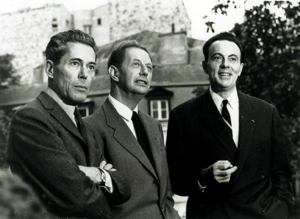History of the Institut Jacques Monod
An institute worthy of its name
In 1965, Jacques Monod, François Jacob and André Lwoff were awarded the Nobel Prize for Medicine and Physiology for “their discoveries concerning the genetic control of enzyme and virus synthesis”. Jacques Monod played a key role in the creation, a year later, of the institute that bears his name.
The initial scientific objective of the institute was to develop molecular biology, which was then a new discipline.
The research carried out today at the Institut Jacques Monod strives to perpetuate the spirit of curiosity and discovery that inspired them.

Jacques Monod, André Lwoff, François Jacob © Institut Pasteur/Archives Jacques Monod
The birth of the institute
The Institut de Biologie Moléculaire (IBM) was founded in 1966, with Raymond Dedonder as its director. The IBM steering committee included Jacques Monod and François Jacob, who would go on to win the Nobel Prize for Medicine in 1965, along with their Pasteurian colleague André Lwoff. This committee defined the major scientific orientations to be developed around the theme of the biochemistry of heredity: Study of replication, Protein biosynthesis, Mechanisms and control of transcription and translation in bacteria and in the cells of higher organisms, Study of differentiation mechanisms, Study of conformations and conformational changes of biological macromolecules, Study of functional associations of macromolecules and the conformational problems posed by these associations.
The IBM premises (8,500 m2) at the Paris Faculty of Science, on the “Halle aux Vins” site, were officially occupied in December 1969. In the year that followed, 13 laboratories, supported by administrative and technical services (including a vast library, workshops, store, etc.), with a total of 143 researchers and teachers and 80 technicians and administrative staff, moved in.
In 1978, IBM underwent the first change in its initial organization; the founding laboratories became 21 research groups organized into 4 departments. Following the resignation of Raymond Dedonder, management was assumed by 2 co-directors, François Chapeville and Giorgio Bernardi, and in 1979 the Institute took the name Institut de Recherche en Biologie Moléculaire (IRBM).
In 1981, François Chapeville remained sole director of the institute, which he restructured into 5 departments with a total of 27 research teams. In 1982, the Institute officially became the Institut Jacques-Monod (IJM). In 1983, to facilitate cooperation between teams, F. Chapeville proposed a different distribution of these teams around 3 departments: Molecular and Cellular Structures and Interactions, Molecular Genetics of Microorganisms and Cell Differentiation, Development. Throughout the 1980s, new groups joined the Institute.
Appointed Director in January 1992, Jacques Ricard once again modified the structure of the IJM in the interests of thematic coherence and improved evaluation; he created 5 departments with intellectual and financial autonomy (Genome Organization and Expression, Supramolecular and Cellular Biology, Microbiology, Developmental Biology, Genome Dynamics and Evolution).
When Jean-Luc Rossignol, the new director of the IJM, took up his post in September 1996, the IJM had a staff of around 400, including numerous PhD students and trainees in 31 groups. Jean-Luc Rossignol decided to maintain the previous structure of 5 departments, while emphasizing the grouping of research themes around space (the components and structural and functional organization of cellular space), time (cellular dynamics and the dynamics of genome evolution), and the flow of information on which the integrated functioning of cells and organisms depends. Alongside the administrative infrastructure, the various technical departments are grouped together in a “technical platform” within which imaging, flow cytometry and molecular modeling are particularly developed.
In 2001, Eric Karsenti took over from Jean-Luc Rossignol, and in January 2002 set up an Institut Fédératif de Recherche, IFR 117 Systems Biology, with a view to re-founding the IJM on the Paris Rive Gauche site. This IFR grouped together the IJM (“from the molecular to the organism”) and around ten laboratories working on functional and adaptive biology and epigenetics.
Under the leadership of Eric Karsenti, then Jean-Antoine Lepesant until the end of 2008, a major effort to recruit new groups was undertaken in preparation for the move to the Paris Rive Gauche premises.
In 2009, Giuseppe Baldacci, professor at Paris Diderot University, took over as head of the Institut Jacques Monod until 2017, succeeded by Michel Werner.
Since September 2023, the Institut Jacques Monod has been headed by Valérie Doye.

